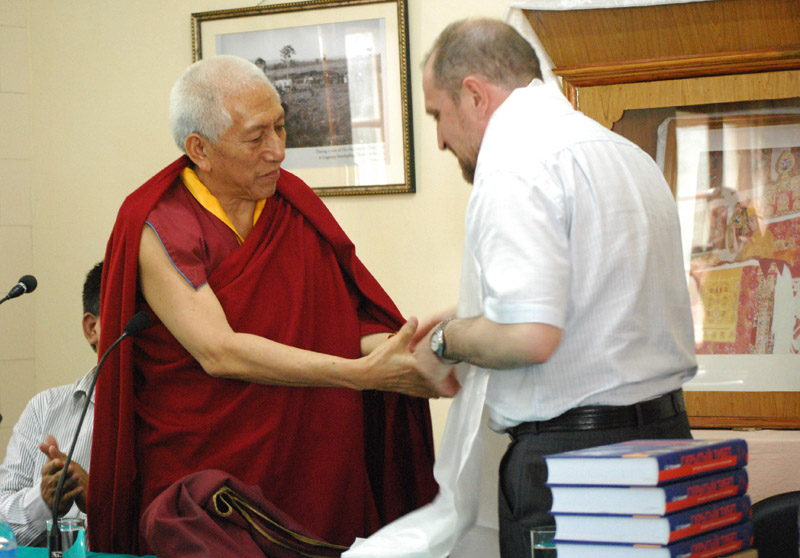 Dharamshala: The Library of Tibetan Works and Archives in Dharamshala was presented today with the most recent book in Russian on Tibet. The book is entitled 'Hidden Tibet: History of Independence and Occupation', and traces the history and development of Tibetan culture and religion from ancient times to the present day. Authored by Dr. Segius L. Kuzmin, Senior Scholar of Russian Academy of Sciences, the book was released on the March 10 2010, the 51st anniversary of the Tibetan National Uprising Day.
Dharamshala: The Library of Tibetan Works and Archives in Dharamshala was presented today with the most recent book in Russian on Tibet. The book is entitled 'Hidden Tibet: History of Independence and Occupation', and traces the history and development of Tibetan culture and religion from ancient times to the present day. Authored by Dr. Segius L. Kuzmin, Senior Scholar of Russian Academy of Sciences, the book was released on the March 10 2010, the 51st anniversary of the Tibetan National Uprising Day.
A summary and review of the piece by Nawang Rabgyal detailed the book as containing 12 chapters in 541 pages and 180 photographs, starting from geography of Tibet and origination of Tibetan people up to the present situation in occupied-Tibet. He felt it to be the most comprehensive and convincing work in Russian language devoted to the question of Tibet. It depicts the history and development of Tibetan culture and religion, which makes very clear that Tibet, had its own independent and unique national identity. The book analyzes the Chinese traditional and geopolitical views as well as politics in respect to "national minorities", and thus makes very clear why China misinterpreted Tibet as a state subordinate to China, or even the part of China, and why it is wrong. It analysis legal argumentation of the Tibetan question and depicts very clearly that according to international law Tibet has never lost her statehood and thus unequivocally Tibet is an occupied country.
The book disproves some erroneous views on history of Tibet. In summary the author writes "Tibet has never been a part of any other state. At the time when China was an inseparable part of Mongolian Yuan Empire and Manchu Qing Empire, Tibet was a separate country but not a part of these empires. It was not a part of Chinese Tang and Ming Empire. Statement that Tibet was a part of neighboring empires is related to ancient Chinese conception of the emperor's global power. Its principles are being wrongfully transferred onto a nation state model in post-revolution China. Inclusion of Tibet into the People's Republic of China was not legitimate. Tibet is an occupied country."
Dr. Segius L. Kuzmin spoke at the presentation today. He discussed his book referring to the ancient history of both Tibet and China. He summarized that "Tibet has never been a part of any other country including China" and felt that as this is clear from the facts, it should from both a political and international perspective, be perceived as an occupied country. Dr. Kuzmin then talked of ancient Chinese history and through an analysis of this he depicts the "blurs" in the Chinese evidence against their claim to Tibet.
Tibetan prime minister and the Speaker of the Tibetan Parliament-in-Exile attended the book event today, together with other dignitaries. The Director of the Library of Tibetan Works and Archives spoke of his great appreciation towards the author and thanked him for his book. He described it as "one of most comprehensive historical books on Tibet's legacy" and felt it was a good contribution.


![Tibet has a rich history as a sovereign nation until the 1950s when it was invaded by China. [Photo: File]](/images/stories/Pics-2024/March/Tibet-Nation-1940s.jpg#joomlaImage://local-images/stories/Pics-2024/March/Tibet-Nation-1940s.jpg?width=1489&height=878)















